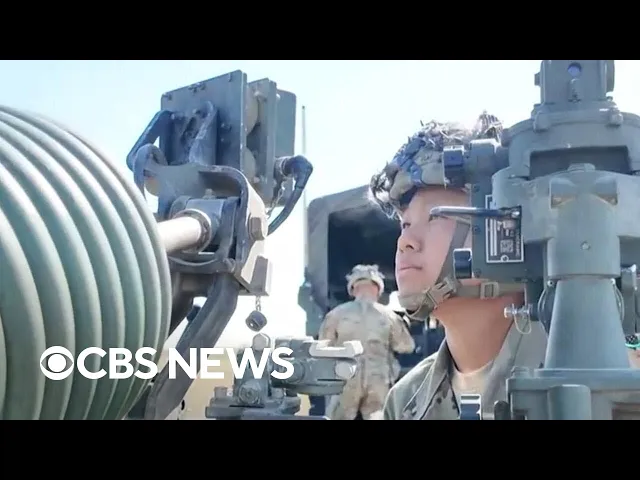Former acting secretary of defense on how AI is changing warfare

AI supercharges warfare's uncertain future
The rapid evolution of artificial intelligence has already transformed industries from healthcare to transportation, but its most consequential impact may be unfolding on the battlefield. In a recent interview, former Acting Secretary of Defense Christopher Miller offered a sobering assessment of how AI is fundamentally reshaping modern warfare—creating both unprecedented opportunities and existential risks. As nation-states and non-state actors alike rush to harness these technologies, military and intelligence communities worldwide are navigating uncharted territory where algorithms could increasingly determine strategic outcomes and human survival.
Key insights from Miller's perspective:
- AI is already revolutionizing intelligence gathering and battlefield awareness through real-time data processing capabilities that far exceed human capacity
- The Pentagon has placed AI development at the center of its modernization strategy, recognizing it as essential to maintaining military superiority
- The most concerning aspect is the potential for autonomous weapons systems that operate without meaningful human oversight, fundamentally altering warfare's ethical and strategic dimensions
The autonomy dilemma we can't ignore
The most profound insight from Miller's assessment centers on the autonomy question: as AI systems become more sophisticated, who—or what—will make life-or-death decisions in combat situations? This isn't merely a philosophical thought experiment but an immediate practical challenge. Military planners must balance tactical advantages of split-second AI decision-making against the moral imperatives of human judgment and accountability.
This tension exists against the backdrop of accelerating global competition. While the United States has publicly committed to keeping humans "in the loop" for lethal force decisions, Miller acknowledges the pressure to match capabilities with less restrained actors. As he notes, adversaries like China and Russia are aggressively pursuing fully autonomous systems with fewer ethical guardrails. This creates the classic security dilemma where defensive measures by one state are perceived as offensive threats by others, potentially triggering an autonomous weapons arms race that no one can control.
Beyond the binary debate
What Miller's analysis doesn't fully address is how AI might create novel forms of warfare beyond traditional kinetic operations. The integration of AI with information operations, for instance, opens disturbing possibilities for highly targeted psychological manipulation at unprecedented scale. We're already witnessing early versions of this through deepfakes and algorithmically optimized disinformation campaigns.
Consider Russia's use of AI-enhanced information warfare in Ukraine
Recent Videos
How To Earn MONEY With Images (No Bullsh*t)
Smart earnings from your image collection In today's digital economy, passive income streams have become increasingly accessible to creators with various skill sets. A recent YouTube video cuts through the hype to explore legitimate ways photographers, designers, and even casual smartphone users can monetize their image collections. The strategies outlined don't rely on unrealistic promises or complicated schemes—instead, they focus on established marketplaces with proven revenue potential for image creators. Key Points Stock photography platforms like Shutterstock, Adobe Stock, and Getty Images remain viable income sources when you understand their specific requirements and optimize your submissions accordingly. Specialized marketplaces focusing...
Oct 3, 2025New SHAPE SHIFTING AI Robot Is Freaking People Out
Liquid robots will change everything In the quiet labs of Carnegie Mellon University, scientists have created something that feels plucked from science fiction—a magnetic slime robot that can transform between liquid and solid states, slipping through tight spaces before reassembling on the other side. This technology, showcased in a recent YouTube video, represents a significant leap beyond traditional robotics into a realm where machines mimic not just animal movements, but their fundamental physical properties. While the internet might be buzzing with dystopian concerns about "shape-shifting terminators," the reality offers far more promising applications that could revolutionize medicine, rescue operations, and...
Oct 3, 2025How To Do Homeless AI Tiktok Trend (Tiktok Homeless AI Tutorial)
AI homeless trend raises ethical concerns In an era where social media trends evolve faster than we can comprehend them, TikTok's "homeless AI" trend has sparked both creative engagement and serious ethical questions. The trend, which involves using AI to transform ordinary photos into images depicting homelessness, has rapidly gained traction across the platform, with creators eagerly jumping on board to showcase their digital transformations. While the technical process is relatively straightforward, the implications of digitally "becoming homeless" for entertainment deserve careful consideration. The video tutorial provides a step-by-step guide on creating these AI-generated images, explaining how users can transform...
